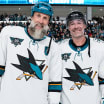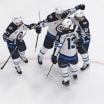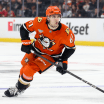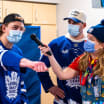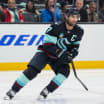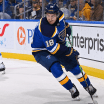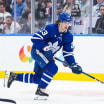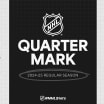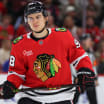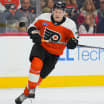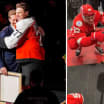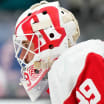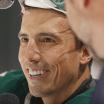Legendary hockey reporter Stan Fischler writes a weekly scrapbook for NHL.com. Fischler, known as "The Hockey Maven," shares his humor and insight with readers each Wednesday.
This week Fischler features former Boston Bruins forward Ed Sandford in his "Voices From The Past" segment.
Sandford played eight seasons with the Bruins (1947-55) and retired in 1956 after splitting one season with the Detroit Red Wings and Chicago Black Hawks. He was an off-ice official in Boston for three decades after his playing career ended.
Ed Sandford played 9 NHL seasons, then off-ice official in Boston
Former Bruins forward tells Fischler he regrets not winning Stanley Cup championship
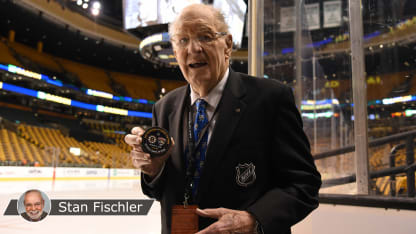
By
Stan Fischler
Special to NHL.com
How did you become a hockey player?
"I didn't intend to be one, I just happened to enjoy the game when I was a kid in Toronto. We had an outdoor rink where everybody skated and it had a neighborhood hockey team. By the time I was 11, I was good enough to make the club and we played teams from nearby towns. I got my interest in the NHL by listening to Foster Hewitt's (Maple) Leafs' broadcasts every Saturday night. When spring came, I switched to lacrosse which was a wonderful conditioner for hockey in the fall."
When did you become more intense about playing hockey?
"The more I played, the better I got and that added to the enjoyment. Meanwhile, teammates were encouraging me to stick with it and move up to the Ontario Hockey Association. I finally got accepted at St.Michael's College -- actually a Toronto high school -- where hockey was a big deal. I made it to the Major team -- sometimes playing defense -- and we went on to win Canada's Junior championship, the Memorial Cup. That got us a lot of attention from NHL scouts who saw pro prospects on our squad."
Who were some of the better players?
"We had Jimmy Thomson and Gus Mortson on defense. Both of them went on to win Stanley Cups with the Maple Leafs along with center Tod Sloan. The great Detroit left wing Ted Lindsay was a St. Mike grad and the Wings also nabbed Red Kelly who actually was my defense partner for a while. Red won Cups with Detroit and then got dealt to Toronto where he won more Cups as a center. Nevertheless, during my time with St. Mike's I still was more interested in getting an education than turning pro."
What changed your mind?
"I didn't know it at the time but the Bruins must have been scouting me because right out of the blue I got an offer to play in Boston. At first I hesitated because I hated the idea of giving up school. I finally decided to give it a shot, and am I ever grateful that I made that decision. It was one of the best moves of my life.
The war (World War II) had ended and the NHL was back to full strength. Granted that it was a very competitive field among the six teams, but right off the bat I was lucky to get a spot on the Bruins varsity for the '47-'48 season."
How good were the Bruins at that time?
"They were a playoff team but not a championship club that year (1947-48). We had future Hall of Famers like Milt Schmidt at center and Frankie Brimsek in goal and they helped keep us competitive. A few of our guys had spent some years in the armed forces and might have lost a step or two. But we had some real hard-nosed competitors on the blue line. One of our defensemen, Pat Egan, was nicknamed 'Boxcar' and was as tough as they come. Then there was Jack Crawford, who was the only fellow in the NHL to wear a helmet, and not for protection. Johnny was bald and the helmet covered it up!"
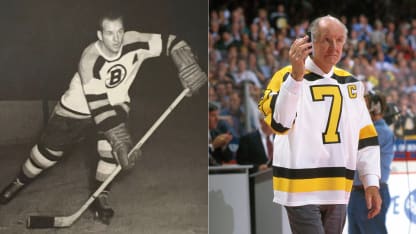
What was your rookie year like?
"Not too bad. For starters, I was able to stick with the big club and play 59 games. That, for me, was an accomplishment. Another was that we finished third behind Toronto and Detroit which put us in the playoffs, another big thing for my first year. I wasn't a high-scoring forward but more a solid, two-way player and, all things considered, 10 goals and 15 assists was a decent start to my big-league career."
How tough was the competition?
"Very. Toronto and Detroit were head and shoulders ahead of the rest of us. Conn Smythe, who ran the Leafs, said that his '47-'48 team was the best Toronto team of all time. Jack Adams' Wings chased them for first-place all season but missed out at the end. The other four clubs all were competitive and we were the best of them, finishing third. The only problem was that we had to face Toronto in the opening playoff round and could only beat them once -- in Boston -- and that was it."
Who was your favorite teammate?
"I had several, but one of the younger guys, Johnny Peirson, was a standout who had been a McGill University student. He was the right wing on my line -- a smart, right-hand shot who played his position very well. I called him 'The Thinking Man's Hockey Player' because he was always watching to see what the opposition was doing and trying to offset them. What I liked best about playing with Johnny was that I pretty much knew what he was going to do when we were on the ice."
What was the most unusual aspect of your NHL career?
"The strangest episode took place during the opening playoff round in 1951 when we went up against Toronto. The incident might even have cost us a trip to the Cup Final that spring. We beat the Leafs, 2-0, in the first game and I figured that if we could win the second one on their ice, we could go on and play for the Stanley Cup. Well, the second game (March 31, 1951) was 1-1 after regulation and stayed that way into the first overtime. While we were awaiting the second sudden death, we were told that this game had to be postponed. Toronto had what they then called 'Blue Laws' and no games could be played on Sundays. Well, it was almost midnight on Saturday night so that game had to be called off. The next one was in Boston and they beat us 3-0 and went on to take us in the next three and we were done. But if that game hadn't been called off -- and we went on to win -- who knows how the series would have gone?"
When did you finally reach the Stanley Cup Final?
"That was in 1952-53 and we surprised a lot of people. As it happened, in the first round we played Detroit and, boy, were they ever strong. That season the Red Wings were the defending champs and beat us 7-0 in the playoffs opener. Everybody in hockey figured us for dead but we rebounded in Detroit and stunned them in the second game, 5-3. When we got back home our third-liner, Jack McIntyre, scored a game-winning overtime goal and from there we went on to knock out Detroit in six games. I got six goals in that series and it put us up against the (Montreal) Canadiens in the final round. I was getting closer than ever to the Stanley Cup."
What went wrong?
"We played Montreal and the Canadiens were loaded at every position, from goal out to the 'Punch Line' with Rocket Richard, Toe Blake and Elmer Lach. We won one game -- the second contest up at The Forum -- and that's all, although Game 5 was a classic. The game was tied 0-0 after three periods but Lach took a pass from Richard early in the overtime and we were toast. Looking backward, I was pleased with my game in both series. In fact, years later, a group of historians voted that -- had there been a Conn Smythe Trophy at that time for playoff MVP -- I would have won it even though we didn't win the Cup."
You left Boston in a huge nine-player trade. Remember?
"It would be hard to forget since more players traded places than ever before. The Bruins sent me to Detroit with Real Chevrefils, Norm Corcoran, Gilles Boisvert and Warren Godfrey. Boston got Terry Sawchuk, Marcel Bonin, Vic Stasiuk and Lorne Davis (before the 1955-56 season). The crazy thing was that I only played four games with Detroit and got traded to Chicago for Metro Prystai. I only played a year for the Black Hawks and then hung up my skates. I was ready for my next hockey career -- this time with the League.
You stayed with the Bruins for more than 35 years as an NHL off-ice official. What jobs did you have?
"I did just about everything from goal judge to official scorer and supervisor of the off-ice officials. All things considered, I had quite a run, on and off the ice. After all, how many people can say he played -- including playoffs -- 483 games for the Bruins and then came back to be involved in the game as an off-ice official for more than three decades."
Any regrets?
"When I look back, I wouldn't have changed anything -- except for the fact that I would have loved to have played for just one Stanley Cup winner. Just one!"


